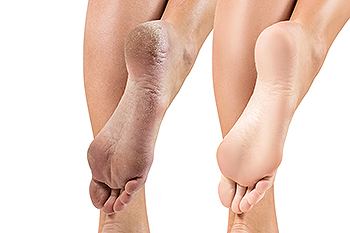
Effective pain management for cracked heels, or heel fissures, is essential to alleviate discomfort and promote healing. Cracked heels often occur due to dry skin, lack of moisture, or underlying medical conditions. To address the pain associated with this condition, several strategies can be employed. Moisturization is key. Exfoliation can also help, but excessive scrubbing can worsen the condition. Foot soaks in warm water can soften the skin and provide relief. Well-fitting footwear with adequate cushioning plays a role in pain management as well. Avoid open-back shoes or sandals that may exacerbate the issue. Heel cups or orthotic insoles may help reduce pressure on the cracked areas and provide additional support. If you have persistent cracked heels or they appear infected, it is suggested that you schedule an appointment with a podiatrist who can provide relief and additional treatment options.
Cracked heels are unsightly and can cause further damage to your shoes and feet. If you have any concerns, contact one of our podiatrists from Crosstown Podiatry. Our doctors can provide the care you need to keep you pain-free and on your feet.
Cracked Heels
Cracked heels appear unappealing and can make it harder for you walk around in sandals. Aside from looking unpleasant, cracked heels can also tear stockings, socks, and wear out your shoes. There are several methods to help restore a cracked heel and prevent further damage.
How Do You Get Them?
Dry skin is the number one culprit in creating cracked heels. Many athletes, walkers, joggers, and even swimmers suffer from cracked heels. Age and skin oil production play a role to getting cracked heels as well.
Promote Healing
Over the counter medicines can help, especially for those that need instant relief or who suffer from chronic dry feet.
Wear Socks – Wearing socks with medicated creams helps lock in moisture.
Moisturizers – Applying both day and night will help alleviate dryness which causes cracking.
Pumice Stones – These exfoliate and remove dead skin, which allows for smoother moisturizer application and better absorption into the skin.
Change in Diet
Eating healthy with a well-balanced diet will give the skin a fresh and radiant look. Your body responds to the kinds of food you ingest. Omega-3 fatty acids and zinc supplements can also revitalize skin tissue.
Most importantly, seek professional help if unsure how to proceed in treating cracked heels. A podiatrist will help you with any questions or information needed.
If you have any questions, please feel free to contact our offices located in Wayne, Montclair, and Randolph, NJ . We offer the newest diagnostic and treatment technologies for all your foot care needs.
